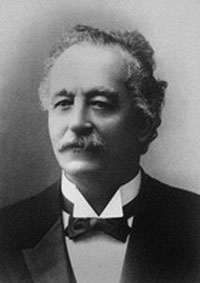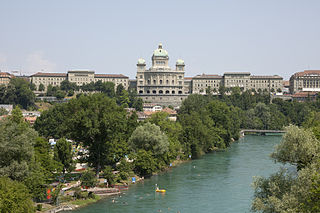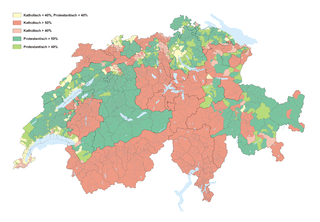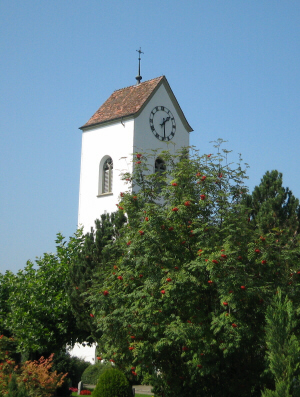
Switzerland, officially the Swiss Confederation, is a landlocked country located in west-central Europe. It is bordered by Italy to the south, France to the west, Germany to the north and Austria and Liechtenstein to the east. Switzerland is geographically divided among the Swiss Plateau, the Alps and the Jura; the Alps occupy the greater part of the territory, whereas most of the country's population of 9 million are concentrated on the plateau, which hosts its largest cities and economic centres, including Zürich, Geneva, and Basel.

Élie Ducommun was a Swiss peace activist. He was a Nobel laureate, awarded the 1902 Nobel Peace Prize, which he shared with Charles Albert Gobat.

Bern, or Berne, is the de facto capital of Switzerland, referred to as the "federal city". With a population of about 133,000, Bern is the fifth-most populous city in Switzerland, behind Zürich, Geneva, Basel and Lausanne. The Bern agglomeration, which includes 36 municipalities, had a population of 406,900 in 2014. The metropolitan area had a population of 660,000 in 2000.

The Federal Council is the federal cabinet of the Swiss Confederation. Its seven members also serve as the collective head of state and government of Switzerland. Since after World War II, the Federal Council is by convention a permanent grand coalition government composed of representatives of the country's major parties and language regions.

The Social Democratic Party of Switzerland, also called the Swiss Socialist Party, is a political party in Switzerland. The SP has had two representatives on the Federal Council since 1960 and received the second-highest number of votes in the 2023 Swiss federal election.

The canton of Bern, or Berne, is one of the 26 cantons forming the Swiss Confederation. Its capital city, Bern, is also the de facto capital of Switzerland. The bear is the heraldic symbol of the canton, displayed on a red-yellow background.

The National Council is the lower house of the Federal Assembly, and the upper house being the Council of States. With 200 seats, the National Council is the larger of the two houses.

The Green Party of Switzerland is a green political party in Switzerland. It is the fifth-largest party in the National Council of Switzerland and the largest party that is not represented on the Federal Council.

Bern railway station serves the municipality of Bern, the federal city of Switzerland. Opened progressively between 1858 and 1860, and rebuilt several times since then, it lies on the Olten–Bern and the Lausanne–Bern lines and is near the end of the Lötschberg line. The station is owned by the Swiss Federal Railways (SBB CFF FFS). Train services to and from the station are operated by the Swiss Federal Railways, the Bern-Lötschberg-Simplon railway (BLS) and the metre gauge Regionalverkehr Bern-Solothurn (RBS). Trains calling at the station include ICEs, and international trains to Italy.

The University of Bern is a public research university in the Swiss capital of Bern. It was founded in 1834. It is regulated and financed by the Canton of Bern. It is a comprehensive university offering a broad choice of courses and programs in eight faculties and some 150 institutes. With around 19,000 students, the University of Bern is the third largest university in Switzerland.

The Federal Palace is a building in Bern housing the Swiss Federal Assembly (legislature) and the Federal Council (executive). It is the seat of the government of Switzerland and parliament of the country. The building is a listed symmetrical complex just over 300 metres (980 ft) long. It is considered one of the most important historic buildings in the country and listed in the Swiss Inventory of Cultural Assets of National Importance. It consists of three interconnected buildings in the southwest of Bern's old city. The two chambers of the Federal Assembly, the National Council and Council of States, meet in the parliament building on Bundesplatz.
The Swiss Confederation comprises the 26 cantons of Switzerland.

The Protestant Church in Switzerland (PCS), formerly named Federation of Swiss Protestant Churches until 31 December 2019, is a federation of 25 member churches – 24 cantonal churches and the Evangelical-Methodist Church of Switzerland. The PCS is not a church in a theological understanding, because every member is independent with its own theological and formal organisation. It serves as a legal umbrella before the federal government and represents the church in international relations. Except for the Evangelical-Methodist Church, which covers all of Switzerland, the member churches are restricted to a certain territory.

Vechigen is a municipality in the Bern-Mittelland administrative district in the canton of Bern in Switzerland. Until the administrative centralization of 1966 it was made up of four semi-autonomous communities; Vechigen, Sinneringen with Boll and Dentenberg, Utzigen with Lindental and Berg with Littewil and Radelfingen.
The Swiss Red Cross, or SRC, is the national Red Cross society for Switzerland.
Women in Switzerland gained the right to vote in federal elections after a referendum in February 1971. The first federal vote in which women were able to participate was the 31 October 1971 election of the Federal Assembly. However it was not until a 1990 decision by the Federal Supreme Court of Switzerland that women gained full voting rights in the final Swiss canton of Appenzell Innerrhoden.

The World Federalist Movement/Institute for Global Policy, Ltd. is an organization that advocates for a democratic world government of a world federalist system, formed in 1947 in Montreux, Switzerland.
Luc Sels is a Belgian sociologist.

The 2025 UEFA Women's Championship will be the 14th edition of the UEFA Women's Championship, the quadrennial international football championship organised by UEFA for the women's national teams of Europe. The tournament will be played in Switzerland from 2 to 27 July 2025. It will be the third edition since it was expanded to 16 teams. The tournament will return to its usual four-year cycle after the previous tournament was indirectly delayed to 2022 due to the COVID-19 pandemic.














